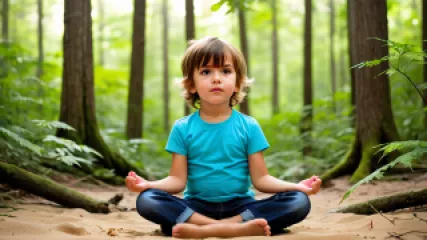Burnout Prevention
My Journey to Overcoming Burnout: A Holistic ApproachAs I sit here, pen in hand, I can't help but reflect on the arduous journey I've undertaken to reclaim my life from the grips of burnout. It's been a winding path, filled with challenges, self-discovery, and a deep, unwavering determination to find a way back to balance and fulfillment. But through it all, I've learned that the key to overcoming burnout lies not in a quick fix, but in a holistic approach that addresses the root causes and empowers me to cultivate a more sustainable, fulfilling way of living.It all started a few years ago, when the demands of my high-pressure job, coupled with personal stressors, began to take a significant toll on my physical and mental well-being. I found myself constantly fatigued, my motivation dwindling, and a sense of disconnection creeping into every aspect of my life. The once-vibrant passion I had for my work had been replaced by a nagging feeling of emptiness and a growing desire to escape.Recognizing the Signs of BurnoutAt first, I brushed off the warning signs, convincing myself that I could power through the exhaustion and push past the emotional turmoil. But as the days turned into weeks, and the weeks into months, the cracks in my well-being became increasingly apparent. I would find myself staring blankly at my computer screen, unable to focus on the tasks at hand, or tossing and turning at night, my mind racing with worry and anxiety.It was during one particularly grueling workday that I finally acknowledged the truth: I was experiencing burnout, a state of physical, emotional, and mental exhaustion that had been slowly creeping up on me. The realization was both liberating and terrifying â liberating, because I now had a name for the struggle I had been facing, but terrifying, because I knew that addressing burnout would require a significant and sustained commitment to my own well-being.Embarking on a Holistic ApproachWith this newfound clarity, I knew that a traditional, one-dimensional approach to addressing my burnout would not be enough. I needed a holistic plan that would address the multiple facets of my well-being â physical, mental, emotional, and spiritual. And so, I set out on a journey of self-discovery, determined to find the right combination of strategies and practices that would help me regain my balance and rediscover my passion for life.Physical WellnessThe first step in my holistic approach was to focus on my physical well-being. I recognized that the relentless pace of my work and the neglect of my body had taken a significant toll, and I knew that addressing this would be crucial to my recovery. I began by making small but impactful changes to my daily routine, such as incorporating regular exercise, prioritizing healthy meals, and making a conscious effort to get enough sleep.Going for daily walks, even if they were just 15 minutes long, became a cherished ritual that allowed me to disconnect from the constant demands of my work and reconnect with the world around me. I also experimented with different forms of movement, from gentle yoga to high-intensity interval training, finding that the variety and flexibility of my workout routine helped to keep me engaged and motivated.In addition to physical activity, I made a concerted effort to nourish my body with wholesome, nutrient-dense foods. I started planning and preparing my meals in advance, ensuring that I had a steady supply of healthy options that would fuel my body and mind. This not only helped me to maintain a balanced diet, but it also provided a sense of control and agency in an area of my life that had previously been neglected.Finally, I prioritized sleep, recognizing that it was a critical component of my physical and mental well-being. I established a consistent sleep routine, ensuring that I was getting at least 7-8 hours of quality sleep each night. I also experimented with various sleep-enhancing techniques, such as practicing relaxation exercises before bedtime and limiting my exposure to blue light-emitting devices in the evenings.Mental and Emotional Well-beingAlongside my focus on physical wellness, I knew that addressing the mental and emotional aspects of my burnout would be equally important. The relentless stress and pressure I had been experiencing had taken a significant toll on my mental health, and I recognized that I needed to make a concerted effort to cultivate a more balanced and resilient mindset.One of the first steps I took was to engage in regular mindfulness and meditation practices. I found that taking even just a few minutes each day to sit in stillness, focus on my breath, and quiet the constant chatter of my mind, had a profound impact on my ability to manage stress and maintain a sense of inner calm. I experimented with different meditation techniques, from guided visualizations to body scans, and found that the practice that resonated most with me was a simple, yet powerful, breath-focused meditation.In addition to meditation, I also made a conscious effort to engage in activities that nourished my emotional well-being. I reconnected with old hobbies and interests, such as painting and reading, that had been neglected during the height of my burnout. I also made time for social connection, scheduling regular meetups with friends and family, and being intentional about cultivating meaningful relationships that provided a sense of belonging and support.One of the most transformative aspects of my holistic approach was the decision to seek professional support. I recognized that I needed an outside perspective and the guidance of a mental health professional to help me navigate the complex emotions and thought patterns that were contributing to my burnout. I worked with a therapist who specialized in burnout recovery, and together, we explored the root causes of my stress and developed a comprehensive plan for rebuilding my resilience and emotional well-being.Spiritual and Existential ExplorationAs I delved deeper into my journey of burnout recovery, I found that addressing the physical and mental aspects was only one piece of the puzzle. I also needed to explore the spiritual and existential dimensions of my experience, to uncover a deeper sense of purpose and meaning that could provide a foundation for a more sustainable way of living.This journey of spiritual exploration took many forms, from engaging in practices like journaling and contemplative walking, to seeking out the guidance of spiritual teachers and mentors. I found that reconnecting with nature, whether through long hikes in the woods or simply sitting in a park and observing the changing seasons, had a profoundly calming and grounding effect on my mind and spirit.I also explored various contemplative traditions, from Buddhism to Stoicism, and began to incorporate their teachings and practices into my daily life. I found that the emphasis on mindfulness, self-awareness, and the acceptance of life's impermanence, offered a valuable counterbalance to the relentless pursuit of productivity and achievement that had contributed to my burnout.One of the most profound realizations that emerged from this spiritual exploration was the importance of cultivating a sense of purpose and meaning that extended beyond the confines of my work. I began to ask myself deeper questions about my values, my passions, and the legacy I wanted to leave behind. This led me to make significant changes in my life, including shifting the focus of my career and engaging in more volunteer work and community service.Integrating the Holistic ApproachAs I progressed on my journey to overcome burnout, I found that the true power of this holistic approach lay in the way the different elements worked together, each one reinforcing and amplifying the others. The physical wellness practices, for example, not only improved my energy and stamina but also had a positive impact on my mental and emotional well-being, as I experienced the mood-boosting effects of regular exercise and proper nutrition.Similarly, the mental and emotional work I did, through practices like meditation and therapy, helped to cultivate a greater sense of self-awareness and resilience, which in turn supported my efforts to maintain a healthy lifestyle and find deeper meaning in my life. And the spiritual exploration I undertook provided a broader, more transcendent perspective that helped me to let go of the need for constant productivity and achievement, and instead focus on living with a greater sense of balance and inner peace.As I look back on this journey, I realize that overcoming burnout was not a linear process, but rather a cyclical one, with moments of progress and setbacks, breakthroughs and challenges. But through it all, I remained committed to the holistic approach, trusting that the combination of physical, mental, emotional, and spiritual practices would ultimately lead me to a more sustainable and fulfilling way of living.Lessons Learned and Advice for OthersAs I reflect on my journey to overcome burnout, I've learned several valuable lessons that I believe can be helpful for others who may be facing similar struggles:1. Recognize the Signs EarlyDon't wait until burnout has fully taken hold before taking action. Be attuned to the subtle signs, such as persistent fatigue, lack of motivation, and emotional detachment, and address them proactively before they escalate into a full-blown crisis.2. Embrace a Holistic ApproachTackling burnout requires a multifaceted approach that addresses the physical, mental, emotional, and spiritual aspects of your well-being. Don't rely on a single solution or quick fix â instead, commit to a comprehensive plan that incorporates a variety of complementary practices and strategies.3. Be Patient and PersistentOvercoming burnout is not a quick or easy process. It requires consistent effort and a willingness to embrace the ups and downs of the journey. Trust that with time and dedication, the pieces will start to fall into place, and you will begin to regain a sense of balance and fulfillment.4. Seek Professional SupportWhile self-care is essential, there may be times when you need the guidance and expertise of a mental health professional, such as a therapist or coach, to help you navigate the complexities of burnout recovery. Don't hesitate to reach out and ask for help â it's a sign of strength, not weakness.5. Prioritize Self-CompassionRemember to be kind and gentle with yourself throughout the process. Burnout can be a deeply challenging and isolating experience, and it's important to approach your recovery with a spirit of self-understanding and self-acceptance, rather than judgment or criticism.As I continue to navigate the path forward, I am filled with a renewed sense of purpose and a deep appreciation for the power of a holistic approach to well-being. While the journey has not been an easy one, I am grateful for the lessons I have learned and the transformations I have undergone. My hope is that by sharing my story, I can inspire and empower others who are struggling with burnout to embark on their own journey of healing and self-discovery.Remember, the key to overcoming burnout lies not in a quick fix, but in a sustained, holistic commitment to your overall well-being. By addressing the physical, mental, emotional, and spiritual aspects of your life, you can reclaim your sense of purpose, passion, and fulfillment, and forge a path towards a more sustainable and balanced way of living.















